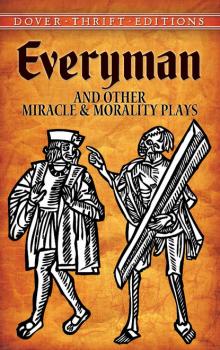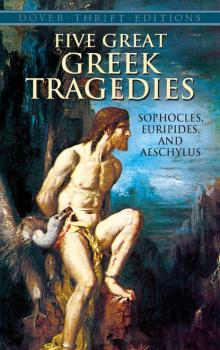Dover Thrift Editions
Скачать книги из серии Dover Thrift EditionsThe Gallic War
The only chronicle by an ancient general of his own campaigns, this historical treasure is also a work of profound literary merit. Julius Caesar's fascinating account of his conquests offers a trove of priceless details about the cultures of Gaul, Germany, and Britain during the First century B.C.—and of the great man himself.Despite his extensive background in politics, Caesar expresses himself without hiding behind rhetoric, in an uncluttered, factual style. Vigorous, direct, and eloquent, his accounts resemble memoirs or historical outlines rather than a formal histories. His notes on cultural matters, although secondary to his attention to military affairs, offer the era's most complete picture of the settings and personalities among Celtic and German tribes. This excellent translation offers several helpful features.
English Victorian Poetry
This outstanding, modestly priced anthology presents over 170 poems by the major poets of the 19th century, including Alfred, Lord Tennyson; Robert Browning; Elizabeth Barrett Browning; Arthur Hugh Clough; Edward FitzGerald; Matthew Arnold; Dante Gabriel Rossetti; Christina Rossetti; Coventry Patmore; George Meredith; William Ernest Henley; Algernon Charles Swinburne; Gerard Manley Hopkins; Rudyard Kipling; and many others. An introduction and brief biographical notes on the poets are included. Includes «The Jumblies» and «Jabberwocky.»
The Flowers of Evil & Paris Spleen
Sex and death, rebellion, corruption — the themes of Charles Baudelaire's sensual poems sparked outrage upon their 1857 debut. His masterpiece, Flowers of Evil (Les Fleurs du Mal), was dismissed as decadent and obscene and banned in France for nearly a century. Although Baudelaire died in obscurity, today he is recognized as one of the nineteenth century's greatest and most influential poets, whose works were ahead of their time. This unique collection captures the fevered spirit of the transition from Romanticism to Modernism with authoritative interpretations of fifty-one poems from Flowers of Evil. In addition, fourteen prose poems from the posthumously published Paris Spleen offer poignant reflections on the city and its humbler denizens. Noted scholar Wallace Fowlie provides definitive translations of these verses.
Four Great Tragedies
Among the most studied, most read, and most admired works in world literature, the tragedies of Shakespeare constitute a body of work unrivaled in dramatic brilliance, beauty of language, and profundity of thought. This convenient and affordable volume—ideal for students and all lovers of literature—features four of the playwright’s greatest works: Hamlet, the revenge drama centering on the introspective Prince of Denmark—one of literature's most discussed and contentious characters, and the role that every actor longs to play; Macbeth, otherwise known as «The Scottish Play,» concerning a nobleman's overweening ambition; Othello, in which a gallant soldier and loving husband is undone by jealousy; and Romeo and Juliet, the timeless tale of the young lovers whose names are synonymous with star-crossed romance.
Four Great Histories
Among the most studied, read, and admired works in world literature, Shakespeare's histories are unmatched for their dramatic brilliance, beauty of language, and profundity of thought. This convenient and affordable volume — ideal for students and lovers of literature — features four of the playwright's greatest historical works:Henry IV, Part 1 masterfully combines comedy and historic events in fifteenth-century England while chronicling the rebellion within Henry's kingdom and portraying events in the life of the profligate young Prince Hal Henry IV, Part II, highlighted by spectacular battles and tender love scenes, witnesses Hal's maturation and the development of his leadership abilities Henry V explores the means by which the «ideal monarch» invades France, wins at Agincourt, and claims the French throne Richard III follows the scheming Duke of Gloucester as he systematically exterminates all those who thwart his plans to succeed to the English throne
Everyman
Western drama, having all but disappeared during the Dark Ages, reemerged spontaneously in the liturgy and life of the medieval church. Vernacular miracle plays of England's Middle Ages were performed by lay people — many by trade guilds — unschooled in church Latin, but familiar with the biblical events upon which the dramas were based. Morality plays provided moral instruction, their principal characters vivid personifications of virtue and vice. The most durable of the morality plays has proven to be Everyman, whose central character, summoned by Death, must face final judgment on the strength of his good deeds. This venerable drama is reprinted here along with three other medieval classics: The Second Shepherds' Play, Noah's Flood, and Hickscorner.
Ghosts
The innovative dramas of Henrik Ibsen created a sensation among 19th-century audiences with their mordant attacks on social conventions. Among the finest of these ground-breaking works was Ghosts, first performed in 1881. In it, the playwright assailed the hypocrisy of moral codes, offering a daring treatment of such then-taboo issues as infidelity, venereal disease, and illegitimacy. Ibsen substituted the modern scientific idea of heredity for the ancient Greek concept of fate, exposing hidden sins of the past as the roots of corruption.The sins of the past are at the heart of the play, whose haunted heroine, Mrs. Helen Alving, has accepted her pastor's counsel and endured her husband's many infidelities in silence. Ten years after Alving's death, she is to dedicate an orphanage in his memory. Her son Oswald, kept innocent of his father's profligacy, returns home for the dedication. Oswald's attraction to the housemaid — in reality, his half-sister — conjures up the ghost of his parents' unhappy marriage. This disastrous romance, along with Oswald's increasing symptoms of the venereal disease inherited from his father, force Mrs. Alving to confront her own «ghosts.»A powerful and engrossing psychological drama, Ghosts serves as an excellent entrée to Ibsen's other works and helps confirm his status as «the father of modern drama.»
The Eternal Husband
Fyodor Dostoyevsky (1821–1881), the brilliant Russian novelist whose psychological delvings into the human soul profoundly influenced the twentieth-century novel, wrote a prolific amount of shorter works that are masterpieces in their own right. His novella The Eternal Husband is considered one of the author’s most powerful and perfect creations.This surreal tale of duality and interchanging rivalry explores the life of a rich, idle man suddenly forced to confront the husband of his dead mistress. With keen insight into the human condition, the story relates the shared hatred, love, and guilt of the two men. Ripe with the emotional themes central to Dostoyevsky's greatest novels, including morality, the bonds of sexual love, mental torture, and neurosis, The Eternal Husband reveals the full range of the author's captivating genius.
Family Happiness and Other Stories
Although best known for War and Peace and Anna Karenina, Leo Tolstoy did not confine his literary talents to voluminous works. He was also a master of the short story and the long story — the particularly Russian form known as povest'. Each of the tales in this collection exhibits the rich detail, vivid narration, and startling truths that characterize Tolstoy's famous novels.Two unusual, intriguing short stores — «Three Deaths» and «The Three Hermits» — appear here, along with four powerful long stories: «Family Happiness,» «The Devil,» «Father Sergius,» and «Master and Man.» «Family Happiness,» the first story in this compilation, features a Tolstoyan theme that recurs both here and elsewhere in the author's writings: «The only certain happiness in life is to live for others.» Written over a period of 40 years or more, these works display the author's evolving perspectives on love, marriage, art, politics, and patriotism. They offer an eclectic introduction to the great Russian writer's fiction as well as a feast for those already acquainted with the pleasures of reading Tolstoy.
Five Great Greek Tragedies
This remarkably low-priced anthology brings together five of the greatest, most studied, and most performed Greek tragedies, each in an outstanding translation:• Oedipus Rex and Electra by Sophocles (translated by George Young), in which the much-admired playwright explores the individual's search for truth and self-knowledge• Medea and Bacchae by Euripides (translated by Henry Hart Milman), favorites with modern audiences for their psychological subtlety and the humanity of their characters• Prometheus Bound by Aeschylus (translated by George Thomson), a monumental work that examines relations between humans and the godsThese masterpieces of world literature represent the very apex of Greek drama and are essential for both the home library and the classroom.









